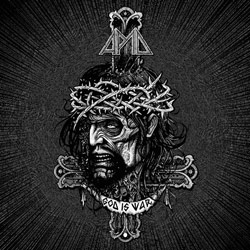
God Is War
Southern Lord
A memorable crust-punk album is hard to come by in this modern millennium, but that’s exactly what All Pigs Must Die has accomplished with its debut full-length, God Is War. Featuring members of Converge and The Hope Conspiracy, All Pigs Must Die lay out their attack with a remarkable amount of musical variety, slowing to doom-metal churns when the music calls for excessive dread and galloping to double-time hardcore tempos and blasting when the band wants to deliver quick jabs to the chin. While song structures and guitar tones may vary song to song, God Is War is still in the end a punk-influenced metal record. I just wish I had a damn lyric sheet, as I’d really like to know what all this band is singing about.
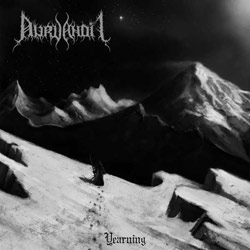
Yearning
Eisenwald
The Frenchies seem to have a stronghold in the world of contemporary black metal, and Aurvandil is yet another ensemble putting in their two francs. Yearning is their first official full-length release, and when we talk length, this album is quite the epic. Clocking in at a total of 64 minutes, Yearning is a long journey into the realm of all things mountainous, snowy and cold. It plods along at a slow pace punctuated by introspective acoustic guitars and only a handful of blast-beat driven explosions. This ethos is decidedly gray as it’s totally absent of any color and rendered in contrasting tones of stark light and overbearing darkness. Par for the course, the drums and vocals are appropriately buried under layers of echoey, reverb-heavy guitars, which again add to the atmosphere Aurvandil strive to achieve. Yearning is reminiscent of Ultima Thulee by fellow Frenchmen Blut Aus Nord. They are both similarly hazy, with indiscernible vocals and tremolo-picked guitars endlessly bouncing off each other and giving the feeling of walking through a blizzard in some barren land.
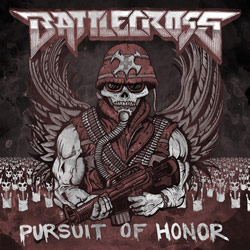
Pursuit of Honor
Metal Blade
Battlecross is a band born and bred in Detroit, a city that has struggled economically as the automobile industry has fallen into decline. Battlecross, though, has embraced their roots, dubbing their style of music “blue collar thrash metal.” Their first album for Metal Blade, Pursuit of Honor, makes a good argument for the band’s philosophical mission of music for the people, by the people. While clearly under the influence of Destruction and early Slayer, the lead vocals of “Gumby” Gunther alternate between thrash snarl and death metal growl, while the band occasionally takes to death metal riffing and structures to keep things interesting.

Be My Slave & Damnation Alley
Metal Blade
For those who don’t know, ’80s Los Angeles metal outfit Bitch is historically significant for a handful of reasons. First off, their 1983 album, Be My Slave, was the very first full-length release by Metal Blade following their Metal Massacre compilation. It was also an album held up as a bad influence by Tipper Gore during her reign of terror heading up the PMRC, lending the band national notoriety. But perhaps Bitch’s most important contribution to heavy metal was redefining what women could contribute, represent and be within the confines of the genre and the scene in general. Frontwoman Betsy Bitch would prowl the stages of the Sunset Strip decked out in spikes, leather bras and other fetish gear, cooing and singing about bondage, sex games, and S&M—subject matters previously taboo.
Now newly remastered and re-released packaged with Bitch’s EP from the previous year, Damnation Alley, Be My Slave comes off somewhat tame and even corny at times, but again you have to remember this record came out damn near 30 years ago and a lot has changed since those days. Musically, though, this album isn’t quite as interesting as the lyrical content. Most would classify Bitch as a metal band, but the virtuoso guitar solos associated with ’80s metal are nowhere to be found, and the simple songwriting has more in common with punk rock. As a “first lady of heavy metal,” Betsy doesn’t have nearly the range of her German counterpart Doro Pesch. In fact, her vocals are kind of limited, and depending on the song, she sounds like either Polly Styrene, Pat Benatar, or a snottier Deborah Harry. And while the album is newly remastered, the guitars and bass still sound rather thin for a metal record. Song-for-song, the package is a very hit and miss curiosity, but with a DVD featuring videos and live performances from back in the day, it does have historical value.
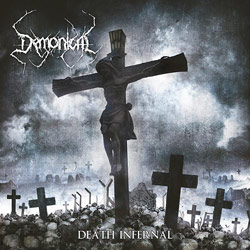
Death Infernal
Metal Blade
Sweden continues to be a metal hotbed, and death metal horde Demonical is yet another reason to keep an ear toward the Scandinavian country. Formed from the ashes of Centinex, Demonical specializes in an eardrum-crushing old school style with lots of melody and orderly verse-chorus structures too often absent from death metal. Demonical wisely blackens the music on Death Infernal with generous doses of tremolo-picked leads and breakdowns. The tunes here are quite catchy and presented in easily digestible song-sized lengths, which again isn’t necessarily part and parcel for most modern death metal. Sverker Widgren’s hollow growl sounds particularly fantastic and bears the unusual attribute of being intelligible without the aid of a lyric sheet. The lyrics are pretty much what you expect, though: tributes to the devil, tales of apocalypse and war and so forth. The clear, but heavy, production serves Demonical well, and tracks from the album would not sound out of place on a mixtape alongside Amon Amarth’s slick studio efforts. Far from being the most original thing I’ve ever heard, Death Infernal is—dare I say it— a fun death metal record where most every song is memorable and worthy of repeated listening.

All Guts No Glory
Relapse
California metal stalwarts Exhumed are back once again bringing their brand of goregrind to the masses. Exhumed have been at this game for damn near 20 years, and as exhibited on All Guts No Glory, remain tight and on point even though it’s been eight years since their last release. Like past work, All Guts owes a debt of influence to Carcass. It is a speedy, breakneck affair with plenty of memorable riffs and well-composed song structures. Nothing groundbreaking here, but since it’s done so well, it matters little. In fact, Exhumed’s “if it ain’t broke, don’t fix it” approach might be their best asset.
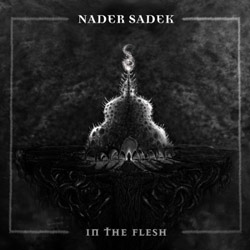
In the Flesh
Season of Mist
Nader Sadek is an Egyptian-born, New York–based visual and conceptual artist who apparently also loves death metal and has put together a supergroup of sorts to convey his thoughts on humankind’s relationship with and dependency on petroleum and the negative side effects. Of course, I would have had no clue what the lyrics were about without a lyric sheet, but that is by no means a knock on the deep growly vocals from Steve Tucker (of Morbid Angel fame). Guitarist Rune Erickson (a.k.a. Blasphemer of Mayhem) and drummer Flo Mournier (Cryptopsy) are the other musicians on this rather short 30-minute concept album. And what of Nader Sadek himself? Apparently he is not a performer of any sort on this album that bears his name, instead supplying the concept and direction for the music contained within In the Flesh. The music is pretty barebone and comes across as rawer, darker and artier than most death metal. While competently performed, the songs aren’t all that memorable once the disc has stopped playing, though they do leave a vague aesthetic impression.

For Winter Fire
Flenser
Given Seidr’s music, artwork, aesthetics and import label of release, it’s easy to see why someone might make the mistake of thinking the band is from some Scandinavian country. However, Seidr’s frosty hybrid of doom and black metal comes from Louisville, Kentucky in the good ol’ U.S. of A. Seidr’s first official full-length release, For Winter Fire is an aptly titled opus as the predominant musical aesthetics are of all things cold, bitter, wind-swept and icy. The album only occasionally kicks the pace up to mid-tempo while a good deal of time is spent creating atmospheric, mood-setting guitar feedback before the band launches into yet another glacial, monolithic dirge. To mix things up for a minute, approximately halfway through the record is a very somber acoustic piece, “In the Ashes,” but the album soon reverts back to the predominant doom and gloom. At 73 minutes in length, Seidr’s new album can make for a cumbersome listen, like a soundtrack to a long journey where the destination isn’t specific and the trip itself is the only meaning that exists.

Seven Sisters of Sleep
Southern Lord
Southern California’s Seven Sisters of Sleep’s debut recording for Southern Lord is a short but punchy collection of songs that inhabit a world layered in swampy grooves, sludgy stoner metal, and crust-laden punk. The production is pretty clean, though, with the distorted barks that comprise the lead vocals notwithstanding. An educated listener might detect influences ranging from Mastodon and High on Fire to Pantera and even Sardonic Wrath-era Darkthrone—none of which are a bad thing in this reviewer’s book. This album will blast and smoke at optimal volume levels and pounds and grooves in equal quantities.
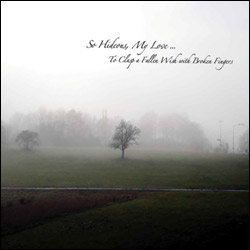
To Clasp a Fallen Wish with Broken Fingers
Play the Assasin
First, points off for having a corny band name. “So Hideous My Love” sounds like the name of some bullshit I’d find at Hot Topic. On the other hand, I kind of dig the artsy-fartsy album title, so I decided to give this NYC combo a chance with a listen to their new four-song EP, To Clasp a Fallen Wish with Broken Fingers. While there are four songs listed, this record plays out like one entire piece of music. It begins with some light, minor-key guitar work that wouldn’t sound out of place on a ’90s shoegaze record. A small string section joins in before being blown out of the water by a blitz of guitars, roaring vocals and jarring drum work. The vocals will probably divide listeners, as the distorted, snarling shrieks hearken to screamo more than metal. As the first track fades, a four-minute interlude of melancholic strings lulls the listener back into a state of calm before once again being disrupted by the ferocious rock onslaught that So Hideous My Love is apparently capable of. From here on out, To Clasp a Fallen Wish mixes post-rock introspection and classical instrumentation with black metal influences in a stirring and effective manner. Recommended if you can dig a cross section of Godspeed You Black Emperor, Isis, Tombs, and Alcest.
Gary Spencer
